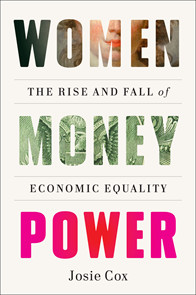 Women Money Power
Women Money Power
The Rise and Fall of Economic Equality
Josie Cox
Abrams Books
New York, NY,
2024, 336 pp., $30
Weaving powerful stories and eye-opening statistics throughout the well-researched book Women Money Power, Josie Cox offers a thought-provoking exploration of the intersectionality of gender, wealth, and influence in contemporary society. Cox delves into this complex topic by examining issues ranging from gender discrimination in the workplace to the evolving landscape of female leadership in the corporate and political spheres. The book’s engaging prose gives readers a better understanding of the persistent nature of gender discrimination while also spotlighting success stories of women striving for financial empowerment and equality.
One of the book’s strengths lies in its comprehensive analysis of long-standing structural and cultural barriers that hinder women’s economic advancement. Cox’s telling of the story of Anna Mae Krier conveys how subtle biases, overt discrimination, and institutional inequalities are all driving factors in gender disparity in pay and promotions. Krier, along with thousands of other women in the United States, joined the industrial and military workforce during World War II, holding roles that had traditionally been filled by men but receiving half their wages. Yet despite demonstrating their capability and commitment, when the war ended, these Rosie the Riveters got pink termination slips rather than parades and accolades. The financial well-being and professional opportunities for millions of women quickly evaporated.
Cox continues her narrative by skillfully navigating the fits and starts of progress in gender-equal power and representation through the stories of other well-known, and in some cases virtually unknown, female activists, leaders, and game changers. Drawing from contemporary case studies and historical precedents, she traces the gradual but significant shifts in societal attitudes toward gender roles and expectations. Legal activists, reproductive rights champions, and civil rights pioneers all contributed in fundamental ways to breaking down gender norms and challenging stereotypes. The stories of Pauli Murray, Margaret Sanger, and Muriel Siebert, among many others, bring to life these struggles and successes. Cox, a financial journalist, also showcases the more recent evolving narratives of women asserting their agency and reshaping traditional power dynamics. She spotlights the #MeToo movement’s impact on workplace harassment and the rise of female corporate and political leaders.
Loading component...
Beyond documenting challenges, Women Money Power offers actionable insights and strategies to advance gender equity in both the public and private spheres. Cox advocates policy reforms such as pay transparency legislation, affordable childcare, parental leave policies, and reproductive rights as crucial steps toward a more inclusive and equitable work environment. Transformative shifts are far more likely when women have equal access to opportunities and resources; ultimately, gender equality can be a source and driver of greater economic and social prosperity.
While Cox’s narrative is largely optimistic about progress in recent years, she does acknowledge persistent obstacles and setbacks. This balance gives the reader a clear picture of the complexity of gender equality and discrimination while still inspiring advocates to press on with resilience and determination. Her meticulous research and expert analysis shine in this compelling and empowering narrative. Ultimately, this book is both a call to action and a beacon of hope for a future where equality is a reality for all, regardless of gender.
Opinions expressed in articles and other materials are those of the authors; they do not necessarily reflect IMF policy.








